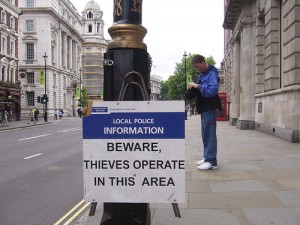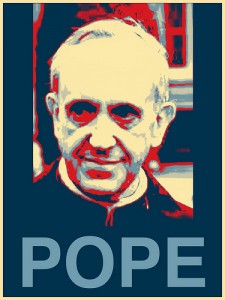Have you ever been robbed? I have and it feels like shit to be robbed…I mean in the criminal sense of some asshole relieving you of your hard earned possessions.
I glanced over yesterday at the corner of my patio and noticed something odd…there was only one bike where there should be two.
WTF?
HTF?
and finally just…F!
If you’ve ever had that experience you can probably remember first just getting inquisitive. How did they pull this off?
Then getting pissed…I’m gonna find’em and rip a new place for the sun not to shine.
Then the focus shifts from the act to the loss itself. That’s when the real emptiness hits.
You feel violated. As if a hole has been torn in the fabric of life…your life. Even though what was stolen is relatively easy to replace, you feel as if you’ve lost a family member. That was my favorite f’ing ______________, you know.
That’s kinda where I am now. And it makes me ponder about the real source of this queasy feeling that I just can’t seem to shake.
If I step back and really assess the possibilities…
Well, of course stealing is wrong and should never be condoned. But it is Christmas and perhaps a poor person stole the bike to give to his or her kid as a Christmas gift. Perhaps, otherwise, the child would receive little or nothing.
Perhaps he or she stole it to have transportation to a job, or at least a better mode of it.
Perhaps it was an addict who traded the bike for his next fix.
Perhaps a poor person stole it, pawned it and then bought groceries for his family with the money.
Whatever the reason, perhaps that person needed that bike more than me.
So, should I be happy about it? Well that would be a stretch, but perhaps, at least, I should not feel so down in the dumps about losing a scrap of metal and rubber. Perhaps I shouldn’t allow it to derail the deeper meaning of my existence.
But that’s exactly what we do.
Why?
This is not the first time something like this has happened to me here in Costa Rica. I’ve had quite a few things stolen…from passports to puppy dogs. And no, it’s not because “those Mexican people steal.” Apart from the obvious geographical error, that’s even more stupid than saying that all bigoted rednecks in-breed….when we know good and well that ALL of them don’t.
When I was still an ex-pat greeny, I heard a saying that you shouldn’t tempt a poor person. I often use that little pith of wisdom in instructing my vacation customers on the dos and don’ts of visiting here…like not flashing your Rolex while amongst the chicheros.
The fact is, people are poor here…poor on a level that makes the poor of the U.S. look, well, not so poor! And they just want a little more of what I have (which ain’t much)…thinking, wrongly, that it will make them happier.
The other day I posted a piece written by Pope Francis that seems to be stirring up quite a bit of controversy in the U.S. One of the quotes that I am sure many would read as a shocking idea is where Pope Frances wrote…
Not to share one’s wealth with the poor is to steal from them and to take away their livelihood. It is not our own goods which we hold, but theirs.
Now hold on just one damn minute, Poper Dope, you mean to tell me that I’m the thief?
Well, maybe what the Holy Father means is that what has been “stolen” from the poor is not necessarily stuff in the material sense, but opportunity and dignity. They just want a little bit of more of that and sometimes make the mistake of thinking that the best way to get it is by, well, stealing it.
How have “we” stolen it from them, you ask? Well the Pope says via a culture of indifference perpetuated by rampant materialism and consumerism and if you’ve read much in this blog, you’ll probably note that I substantially agree with him.
A culture of indifference is one that always puts the self first…the ego. And nothing feeds and fuels the ego like our beloved stuff.
Nothing feeds and fuels the ego like our beloved stuff.
And so I have to ask myself…this question…why do I REALLY feel so shitty to have been robbed?
Maybe the fact of the matter is that the SOB that took my bike is just a little better off for it…
and honestly, I’m really not in the least bit worse.
So, get over it…it’s just stuff and god knows there’s plenty more of it out there.

